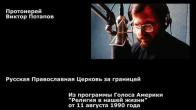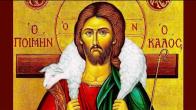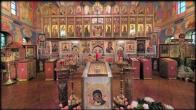You are here
An ancient description of a Christian Basilica
from The Church History of Eusebius
Panegyric upon the building of the churches, addressed to Paulinus, Bishop of Tyre, Book X, Chapter 4:39-72
The description of the church of Tyre which follows is... the oldest detailed description which we have of a Christian basilica. (note 66)
… when one comes within the gates he does not permit him to enter the sanctuary immediately, with impure and unwashed feet; but leaving as large a space as possible between the temple and the outer entrance, he has surrounded and adorned it with four transverse cloisters, making a quadrangular space with pillars rising on every side, which he has joined with lattice-work screens of wood, rising to a suitable height; and he has left an open space in the middle, so that the sky can be seen, and the free air bright in the rays of the sun. Here he has placed symbols of sacred purifications, setting up fountains opposite the temple which furnish an abundance of water wherewith those who come within the sanctuary may purify themselves. This is the first halting-place of those who enter; and it furnishes at the same time a beautiful and splendid scene to every one, and to those who still need elementary instruction a fitting station. But passing by this spectacle, he has made open entrances to the temple with many other vestibules within, placing three doors on one side, likewise facing the rays of the sun. The one in the middle, adorned with plates of bronze, iron bound, and beautifully embossed, he has made much higher and broader than the others, as if he were making them guards for it as for a queen.
In the same way, arranging the number of vestibules for the corridors on each side of the whole temple, he has made above them various openings into the building, for the purpose of admitting more light, adorning them with very fine wood-carving. But the royal house he has furnished with more beautiful and splendid materials, using unstinted liberality in his disbursements. It seems to me superfluous to describe here in detail the length and breadth of the building, its splendor and its majesty surpassing description, and the brilliant appearance of the work, its lofty pinnacles reaching to the heavens, and the costly cedars of Lebanon above them, which the divine oracle has not omitted to mention, saying, 'The trees of the Lord shall rejoice and the cedars of Lebanon which he hath planted.' (Ps. 103/104:18) Why need I now describe the skillful architectural arrangement and the surpassing beauty of each part, when the testimony of the eye renders instruction through the ear superfluous? For when he had thus completed the temple, he provided it with lofty thrones in honor of those who preside, and in addition with seats arranged in proper order throughout the whole building, and finally placed in the middle holy of holies, the altar, and, that it might be inaccessible to the multitude, enclosed it with wooden lattice-work, accurately wrought with artistic carving, presenting a wonderful sight to the beholders. And not even the pavement was neglected by him; for this too he adorned with beautiful marble of every variety.
Then finally he passed on to the parts without the temple, providing spacious exedrae and buildings on each side, which were joined to the basilica, and communicated with the entrances to the interior of the structure. These were erected by our most peaceful Solomon, the maker of the temple of God, for those who still needed purification and sprinkling by water and the Holy Spirit, so that the prophecy quoted above is no longer a word merely, but a fact; for now it has also come to pass that in truth 'the biter glory of this house is greater than the former.' (Hag. 2:9)
For it was necessary and fitting that as her shepherd and Lord had once tasted death for her [the Church], and after his suffering had changed that vile body which he assumed in her behalf into a splendid and glorious body, leading the very flesh which had been delivered from corruption to incorruption, she too should enjoy the dispensations of the Saviour. For having received from him the promise of much greater things than these, she desires to share uninterruptedly throughout eternity with the choir of the angels of light, in the far greater glory of regeneration, (Matt. 19:28) in the resurrection of an incorruptible body, in the palace of God beyond the heavens, with Christ Jesus himself, the universal Benefactor and Saviour. But for the present, she that was formerly widowed and desolate is clothed by the grace of God with these flowers, and is become truly like a lily, as the prophecy says, (Isa 35:1) and having received the bridal garment and the crown of beauty, she is taught by Isaiah to dance, and to present her thank-offerings unto God the King in reverent words. Let us hear her saying, 'My soul shall rejoice in the Lord; for he hath clothed me with a garment of salvation and with a robe of gladness; he hath bedecked me like a bridegroom with a garland, and he hath adorned me like a bride with jewels; and like the earth which bringeth forth her bud, and like a garden which causeth the things that are sown in it to spring forth, thus the Lord God hath caused righteousness and praise to spring forth before all the nations.' (Isa 61:10,11) In these words she exults. And in similar words the heavenly bridegroom, the Word Jesus Christ himself, answers her. Hear the Lord saying, 'Fear not because thou hast been put to shame, neither be thou confounded because thou hast been rebuked; for thou shalt forget the former shame, and the reproach of thy widowhood shalt thou remember no more.' (Isa 54:4)) 'Not as a woman deserted and faint-hearted I hath the Lord called thee, nor as a woman hated from her youth, saith thy God. For a small moment have I forsaken thee, but with great mercy will I have mercy upon thee; in a little wrath I hid my face from thee, but with everlasting mercy will I have mercy upon thee, saith the Lord that hath redeemed thee.' (Isa 54:6-8) 'Awake, awake, thou who hast drunk at the hand of the Lord the cup of his fury; for thou hast drunk the cup of ruin, the vessel of my wrath, and hast drained it. And there was none to console thee of all thy sons whom thou didst bring forth, and there was none to take thee by the hand.' (Isa 51:17,28) 'Behold, I have taken out of thine hand the cup of ruin, the vessel of my fury, and thou shalt no longer drink it. And I will put it into the hands of them that have treated thee unjustly and have humbled thee.' (Isa 51:22-23) 'Awake, awake, put on thy strength, put on thy glory. Shake off the dust and arise. Sit thee down, loose the bands of thy neck.' (Isa. 52:1-2) 'Lift up thine eyes round about and behold thy children gathered together; behold they are gathered together and are come to thee. As I live, saith the Lord, thou shalt clothe thee with them all as with an ornament, and gird thyself with them as with the ornaments of a bride. For thy waste and corrupted and ruined places shall now be too narrow by reason of those that inhabit thee, and they that swallow thee up shall be far from thee. For thy sons whom thou hast lost shall say in thine ears, The place is too narrow for me, give place to me that I may dwell. Then shalt thou say in thine heart, Who hath begotten me these? I am childless and a widow, and who hath brought up these for me? I was left alone, and these, where were they for me?' (Isa 49:18-21).
"These are the things which Isaiah foretold; and which were anciently recorded concerning us in sacred books; and it was necessary that we should sometime learn their truthfulness by their fulfillment. For when the bridegroom, the Word, addressed such language to his own bride, the sacred and holy Church, this bridesman, -- when she was desolate and lying like a corpse, bereft of hope in the eyes of men, -- in accordance with the united prayers of all of you, as was proper, stretched out your hands and aroused and raised her up at the command of God, the universal King, and at the manifestation of the power of Jesus Christ; and having raised her he established her as he had learned from the description given in the sacred oracles. This is indeed a very great wonder, passing all admiration, especially to those who attend only to the outward appearance; but more wonderful than wonders are the archetypes and their mental prototypes and divine models; I mean the reproductions of the inspired and rational building in our souls. This the Divine Son himself created after his own image, imparting to it everywhere and in all respects the likeness of God, an incorruptible nature, incorporeal, rational, free from all earthly matter, a being endowed with its own intelligence; and when he had once called her forth from non-existence into existence, he made her a holy spouse, an all-sacred temple for himself and for the Father. This also he clearly declares and confesses in the following words: 'I will dwell in them and will walk in them; and I will be their God, and they shall be my people.' (2 Cor. 6:16) Such is the perfect and purified soul, so made from the beginning as to bear the image of the celestial Word.
... Building therefore in righteousness, he divided the whole people according to their strength. With some he fortified only the outer enclosure, walling it up with unfeigned faith; such were the great mass of the people who were incapable of bearing a greater structure.
Others he permitted to enter the building, commanding them to stand at the door and act as guides for those who should come in; these may be not unfitly compared to the vestibules of the temple. Others he supported by the first pillars which are placed without about the uadrangular hall, initiating them into the first elements of the letter of the four Gospels. Still others he joined together about the basilica on both sides; these are the catechumens who are still advancing and progressing, and are not far separated from the inmost view of divine things granted to the faithful. Taking from among these the pure souls that have been cleansed like gold by divine washing, he then supports them by pillars, much better than those without, made from the inner and mystic teachings of the Scripture, and illumines them by windows. Adorning the whole temple with a great vestibule of the glory of the one universal King and only God, and placing on either side of the authority of the Father Christ, and the Holy Spirit as second lights, he exhibits abundantly and gloriously throughout the entire building the clearness and splendor of the truth of the rest in all its details. And having selected from every quarter the living and moving and well-prepared stones of the souls, he constructs out of them all the great and royal house, splendid and full of light both within and without; for not only soul and understanding, but their body also is made glorious by the blooming ornament of purity and modesty.
And in this temple there are also thrones, and a great number of seats and benches, in all those souls in which sit the Holy Spirit's gifts, such as were anciently seen by the sacred apostles, and those who were with them, when there 'appeared unto them tongues parting asunder, like as of fire, and sat upon each one of them.' (Act 2:3) But in the leader of all it is reasonable to suppose that Christ himself dwells in his fullness, and in those that occupy the second rank after him, in proportion as each is able to contain the power of Christ and of the Holy Spirit. And the souls of some m of those, namely, who are committed to each of them for instruction and care -- may be seats for angels. But the great and august and unique altar, what else could this be than the pure holy of holies of the soul of the common priest of all? Standing at the right of it, Jesus himself, the great High Priest of the universe, the Only Begotten of God, receives with bright eye and extended hand the sweet incense from all, and the bloodless and immaterial sacrifices offered in their prayers, and bears them to the heavenly Father and God of the universe. And he himself first worships him, and alone gives to the Father the reverence which is his due, beseeching him also to continue always kind and propitious to us all. "Such is the great temple which the great Creator of the universe, the Word, has built throughout the entire world, making it an intellectual image upon earth of those things which lie above the vault of heaven, so that throughout the whole creation, including rational beings on earth, his Father might be honored and adored. But the region above the heavens, with the models of earthly things which are there, and the so-called Jerusalem above, (cf Gal. 4:26) and the heavenly Mount of Zion, and the supramundane city of the living God, in which innumerable choirs of angels and the Church of the first born, those names are written in heaven, (cf. Heb. 12:22-23) praise their Maker and the Supreme Ruler of the universe with hymns of praise unutterable and incomprehensible to us,--who that is mortal is able worthily to celebrate this? ' For eye hath not seen nor ear heard, neither have entered into the heart of men those things which God hath prepared for them that love him.' (1 Cor. 2:9) Since we, men, children, and women, small and great, are already in part partakers of these things, let us not cease all together, with one spirit and one soul, to confess and praise the author of such great benefits to us, 'Who for-giveth all our iniquities, who healeth all our diseases, who redeemeth our life from destruction, who crowneth us with mercy and compassion, who satisfieth our desires with good things.' (Ps. 102/103: 3-5) 'For he hath not dealt with us according to our sins, nor rewarded us according to our iniquities;' (Ps. 102/103: 10) 'for as far as the east is from the west, so far hath he removed our iniquities from us. Like as a father pitieth his own children, so the Lord pitieth them that fear him.' (Ps. 102/103: 12-13)
Rekindling these thoughts in our memories, both now and during all time to come, and contemplating in our mind night and day, in every hour and with every breath, so to speak, the Author and Ruler of the present festival, and of this bright and most splendid day, let us love and adore him with every power of the soul. And now rising, let us beseech him with loud voice to shelter and preserve us to the end in his fold, granting his unbroken and unshaken peace forever, in Christ Jesus our Saviour; through whom be the glory unto him forever and ever. Amen.
(Nicene and Post-Nicene Fathers, Second Series, Volume 1)
PARISH LIFE
Address of our Cathedral
Subscribe to our mailing list
While all the materials on this site are copyrighted, you may use them freely as long as you treat them
with respect and provide attribution on the Russian Orthodox Cathedral of St.John the Baptist of Washington DC.









